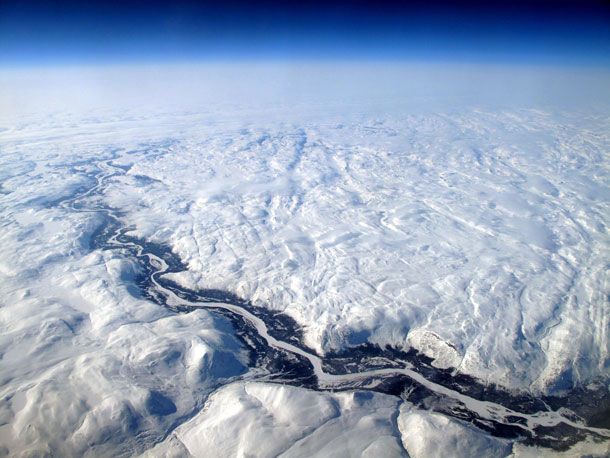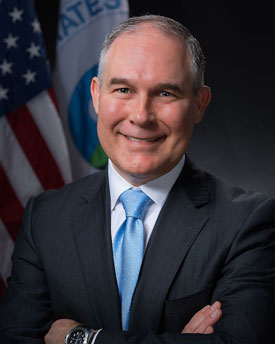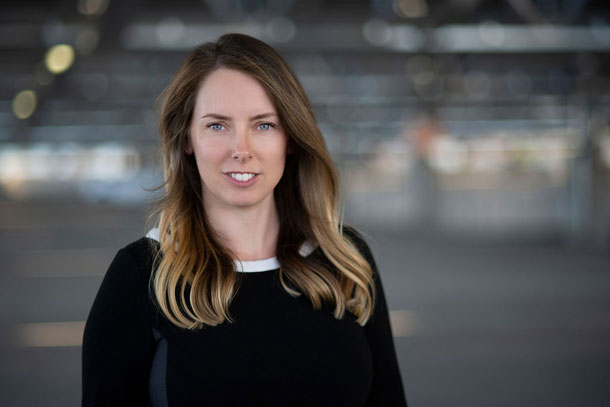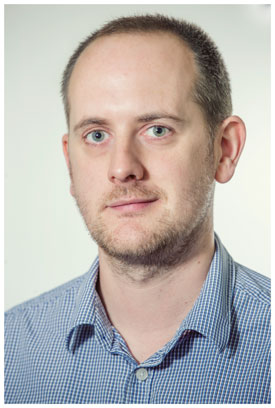Whistleblowers on Trump Science
Air Date: Week of October 11, 2019

Joe Clement studied the effects of climate change on communities living in arctic regions for the Department of Interior. (Photo: Duncan C., Flickr, CC BY NC-2.0)
Six whistleblowers who formerly worked at EPA, the National Park Service and more have come forward to highlight how the Trump Administration has meddled in scientific reports and communication. They say the White House has prevented crucial scientific information about climate change and more from reaching the public and decision makers. Oliver Milman from the Guardian shared their stories with Host Steve Curwood.
Transcript
CURWOOD: It’s Living on Earth, I’m Steve Curwood.
In the nearly three years since President Donald Trump took the oath of office, his administration has slashed environmental regulations it calls burdensome. As Peter Dykstra mentioned earlier, in many of these cases science has been sidelined by the Trump Administration. Six whistleblowers have now come forward to highlight how this White House has prevented crucial scientific information about climate change and more from reaching the public and decisionmakers. Oliver Milman is a reporter with the Guardian who has talked with these whistle blowers. They claim that their work has been ignored, undermined, and altered. Oliver joins me on the line from New York. Welcome to Living on Earth!
MILMAN: Good to be with you Steve.
CURWOOD: So let's talk about these climate whistleblowers in the federal government. What about the senior engineer who was involved with the EPA's vehicles lab? What happened with him?
MILMAN: Yeah, so Jeff Olson was a long term EPA employee, he'd done about 40 years with the agency. And he worked at a lab in Michigan that did testing on cars to see what kind of pollutants they gave out, and how efficient they run. And when Obama came in and started bringing in greenhouse gas standards for vehicles. They said about having a new rule that would ensure that cars running cleaner, he said that that rule essentially was reversed once Trump came in. He said that there was a replacement plan put in that he felt extremely ashamed about. He said, his colleagues felt very shamed about it. And when their names on it, he said that they'd essentially cook the books to make it look like this new rule would be disastrous, and the Trump replacing rule be far better. So essentially, the replacement rule waters down what a bomb was trying to do, allows more pollution to be emitted from cars and trucks. And he felt extremely disgusted by that he felt betrayed by it. And he felt it was the right time to leave, he decided to take retirement. And so, he said it, morale is extremely low, the lowest been in 40 years.
CURWOOD: And what does the EPA say about Jeff Olson?
MILMAN: So they say the new vehicles emission standards, rules are far better, they will save lives, they'll lead to cheaper cars. This is disputed by a lot of experts who say, Oh, actually they cost more because you have to put more more gas in your car because it won't be as efficient as under the Obama rules. So again, there's no specific response to what Jeff had to say other than the agency is doing its best for the people.
CURWOOD: So we look to the Environmental Protection Agency for a number of things, including taking care of clean water and drinkable water. One of the people you wrote about is a whistleblower in terms of the criteria for drinkable water. Talk to me about her story.
MILMAN: Yes, a Betsy Southerland is also a long term, EPA employee, she she started working for them in 1984. She did a 33 years at the agency very much a respected, well liked veteran of of the agency. She worked on clean water programs. And she felt a huge change occurred after the Trump administration took power. And she decided that 2017 would be her last year at the agency. She made this very kind of public retirement speech that she made to colleagues but then kind of released it publicly saying that the mission of the agency has been subverted, that it was causing a risk to people people's health. And since she's left, she's become a very kind of outspoken critic of administration. She says this has made her target of retaliatory action by the administration, which the administration denies. She's become one of the leading voices I suppose in opposition to the Trump administration's handling of environmental protection.
CURWOOD: What does the EPA say about her?

Scott Pruitt had to resign in July of 2018 from his position as the Administrator of the Environmental Protection Agency in the wake of numerous investigations over conflicts of interest. He received sharp criticism for his industry-friendly agenda. (Photo: Eric Vance, EPA, Flickr, Public Domain)
MILMAN: So they've kind of previously called her a kind of, disgruntled former employee, they've kind of denied that there was any improper conduct with her, certainly not the specific denials as formers aware of her allegations, where she said that former industry people were coming in to help rewrite rules around chemical safety. She said there was also an inappropriate contact between Scott Pruitt, who's EPA administrator and Bob Murray, who say who runs a large coal mining firm. And shortly after that conversation, a rule around how coal fire power plants dump their waste, their toxic waste into waterways was repealed. So she's kind of linking the kind of industry influence quite directly to rollbacks in the EPA's rulebook, the EPA hasn't really addressed that other than to insist that it's doing things by the book.
CURWOOD: And what about the person who was looking at possible climate disruption impacts at the Superfund sites, whether it's flooding or heat and such?
MILMAN: Jacob Carter was looking at the impacts of climate change from Superfund sites. So these are toxic sites that the federal government's involved in in terms of cleaning them up. And he was looking at how future storms and sea level rise would affect those sites potentially move pollution around into surrounding areas. So it's a kind of a pressing worry as the world warms up and these weather patterns become more unpredictable. A kind of key concern is how they affect Superfund sites. So he did some work on that was then told, after President Trump came in, he should basically look for a new job. He was there on a year to year basis. So postdoctoral fellow so he would’ve had to be renewed anyway. And that became very unlikely once President Trump came in. And he said there was a deeply upsetting time for him and his life. He was very sad to see the direction that the agency was taking. And he feels the science he was working on was essentially tossed to one side.
CURWOOD: Let's turn now to the chap who was sharing the EPA's Clean Air Scientific Advisory Committee. Talk to me about him and what his concerns and complaints are.
MILMAN: Right. So, this is a man called Chris Frey, he's a environmental engineer at North Carolina State University. And he was chairman of the EPA clean air Scientific Advisory Committee, a member of the science advisory board, which essentially panels set up to advise the EPA on their rules around clean air from things such as trucks and cars and power plants and so on. He was going to be a member of this group that was going to look at particulate matter, which is essentially the suit that's given off from cars and trucks and power plants that kind of can get lodged in your lungs and cause asthma and heart conditions and all kinds of other health impacts, that he was summarily dismissed from this because the group was broken up. The first he knew about it was from a press release on the EPA's website. And then he got an email saying that his services were no longer needed. He felt that there was a political interference in the selection of these boards that they been strayed from their mission of providing fearless and impartial advice to the EPA and was he left, and he decided to speak out about after leaving.
CURWOOD: By the way, I should ask what the Environmental Protection Agency told Professor Frey about why he would no longer be chairing that advisory board.
MILMAN: Right. He said that there was no justification given he was simply told that his services were no longer needed. And they essentially bought in a rule where anybody who got funding from the EPA for previous work was was not allowed to take part, effectively, that got rid of academics and other kind of independent experts and allowed the administration to bring in more industry friendly voices to these boards. And that's the kind of broader point that Chris Efrain others are unhappy about.
CURWOOD: The Department of Interior is in the process of opening up the Arctic National Wildlife Refuge for exploratory drilling and such. And one of the people you wrote about was pushed out from the Interior Department for raising concerns about climate disruption. Talk to me about him and what exactly he did.
MILMAN: Sure, so this is a man called Joe Clement. And he was an expert in the impacts of climate change upon the Arctic region, which is you may know is warming up at about twice the rate as the global average. So, lots of disruption already happening in the Arctic. And that is set to get far worse with the global heating that says expecting this century. So he was looking at the impacts of that, and what can be done for communities that live there. Although it's a kind of very cold and remote place, there are millions of people who live in the Arctic regions around the world. His work was looking very closely at how the government can help people who do live there, he felt he was essentially fired by being taken from this role once the new may stretching came in. And being put into a completely unrelated role, which looked after the royalties paid by oil and gas companies. It's something that he didn't have any experience in is something he had no interest in, it certainly was almost the complete opposite. If you think about the impact of oil and gas companies, when it comes to climate change, it's always the complete opposite job to be working with them on royalties rather than looking the impacts of climate change they contributed to. So, he felt he was effectively pushed out, he left and he filed a whistleblower complaint, which is still ongoing now.
CURWOOD: Bottom line sounds like they did not want him talking about climate disruption at all.
MILMAN: No, he said that they didn't want anybody speaking about the climate crisis. And they certainly don't want anybody talking about the climate crisis very publicly and openly.

Maria Caffrey’s research focuses on climate change. (Photo: Jess Kornaki)
CURWOOD: Now, there's another person in the Interior Department, this person over though the National Park Service, who lost her job as well for speaking out about how climate disruption, how climate change could affect the national parks talk to me about her.
MILMAN: Maria Caffrey she is perhaps one of the most affecting stories, because she she worked for a good kind of four or five years on this study, looking at how sea level rise was affecting national parks across the US. There's about 118, coastal parks that are being affected by sea level rise, which was kind of looking at how that will proceed in the future and how sea level rise will threaten. And so it was essentially this report that she was working on for years was due to be released. And then along came Donald Trump's election. Once his inauguration happened, she was told it was being put on hold and was delayed and pushed back for months and months. She was told it was because of messaging concerns, whatever that meant, she wasn't sure. And then it came to the end of the year 2017. And she went on maternity leave to have a baby. And by the time she came back, she found out that her report was being edited, it was being edited in a very unusual way, in that any mention of human induced climate change was being systematically emitted from the report. And that's what she considered to be inappropriate meddling with her work. So she, she started to push back. And that's when she said things got very nasty. And she was essentially told that she can't be working with the National Park Service anymore.
CURWOOD: So she was fired?
MILMAN: The funding for her job was taken away. And she was told she could no longer she then got demoted down to an intern level where she was being paid about $25,000 a year. And then after that she actually requested to come back to work on the project as a as an unpaid volunteer, but she was turned down. And that she felt pointed the fact that this was a purely political move, it wasn't about saving any money or anything like that. The fact that she was turned down for non payroll suggested that this is an entirely political motivation rather than scientific or a funding one.
CURWOOD: What has the Interior Department said to you about this case in the others involving them?
MILMAN: They don't really address the central accusation that she mentions of human induced climate change were removed. This is something that has happened elsewhere, since the Trump administration's come in. Reports have been either shelved or edited to remove mentions of climate change. So this is a repeated thing that's happening. And there's no real justification given as to why this this will be happening.
CURWOOD: Hey Oliver, what extent were any of these whistleblowers told to lie by the administration to misrepresent the science that they had discovered?

Oliver Milman is an environment reporter for The Guardian. (Photo: Photo courtesy of Oliver Milman)
MILMAN: That's something that Maria Caffery feels she essentially was asked to do when she was asked to remove mentions of human induced climate change from her report, failure essentially, was lying. She said that she told her supervisor that she felt her boss was the American people and the American people deserve to be told the truth. And she said she was told no, you your boss is President Trump. He's the chief executive of the federal government, and we're doing what pleases him. So, she felt there was a direct portrayal there of her mission which she felt was very much to serve the American people. There's this kind of sense of purpose. There's a sense of camaraderie with their colleagues, that they're doing the best for the American people that they are helping protect them from kind of big business and industry that obviously has such sway and Washington DC and they're they're kind of counterpoints that they can actually provide that kind of safeguards to the American people that wouldn't otherwise be there and they feel that that kind of mission has been completely subverted. I think they most of them feel that their work with the federal government was their kind of defining work their lives I think it's very painful to see that wrenched away from them
CURWOOD: Oliver Milman is an environmental reporter for The Guardian. Thanks so much for taking the time with us today.
MILMAN: Thank you very much Steve.
Links
The Guardian | “The Silenced: Meet the Climate Whistleblowers Muzzled by Trump”
Maria Caffrey | “Maria Caffrey’s Climate Research Website”
Inside Climate News | “Top CDC Climate Scientist Files Whistleblower Complaint”
Living on Earth wants to hear from you!
Living on Earth
62 Calef Highway, Suite 212
Lee, NH 03861
Telephone: 617-287-4121
E-mail: comments@loe.org
Newsletter [Click here]
Donate to Living on Earth!
Living on Earth is an independent media program and relies entirely on contributions from listeners and institutions supporting public service. Please donate now to preserve an independent environmental voice.
NewsletterLiving on Earth offers a weekly delivery of the show's rundown to your mailbox. Sign up for our newsletter today!
 Sailors For The Sea: Be the change you want to sea.
Sailors For The Sea: Be the change you want to sea.
 The Grantham Foundation for the Protection of the Environment: Committed to protecting and improving the health of the global environment.
The Grantham Foundation for the Protection of the Environment: Committed to protecting and improving the health of the global environment.
 Contribute to Living on Earth and receive, as our gift to you, an archival print of one of Mark Seth Lender's extraordinary wildlife photographs. Follow the link to see Mark's current collection of photographs.
Contribute to Living on Earth and receive, as our gift to you, an archival print of one of Mark Seth Lender's extraordinary wildlife photographs. Follow the link to see Mark's current collection of photographs.
 Buy a signed copy of Mark Seth Lender's book Smeagull the Seagull & support Living on Earth
Buy a signed copy of Mark Seth Lender's book Smeagull the Seagull & support Living on Earth

